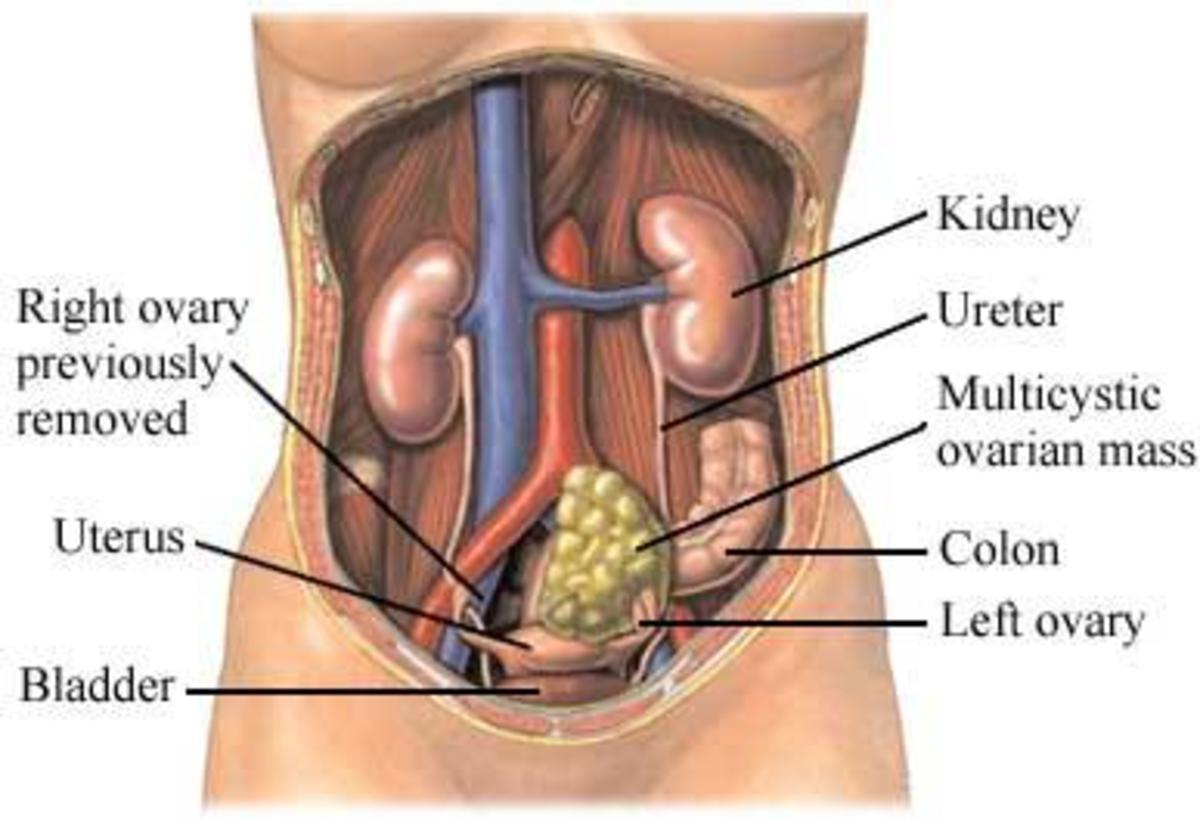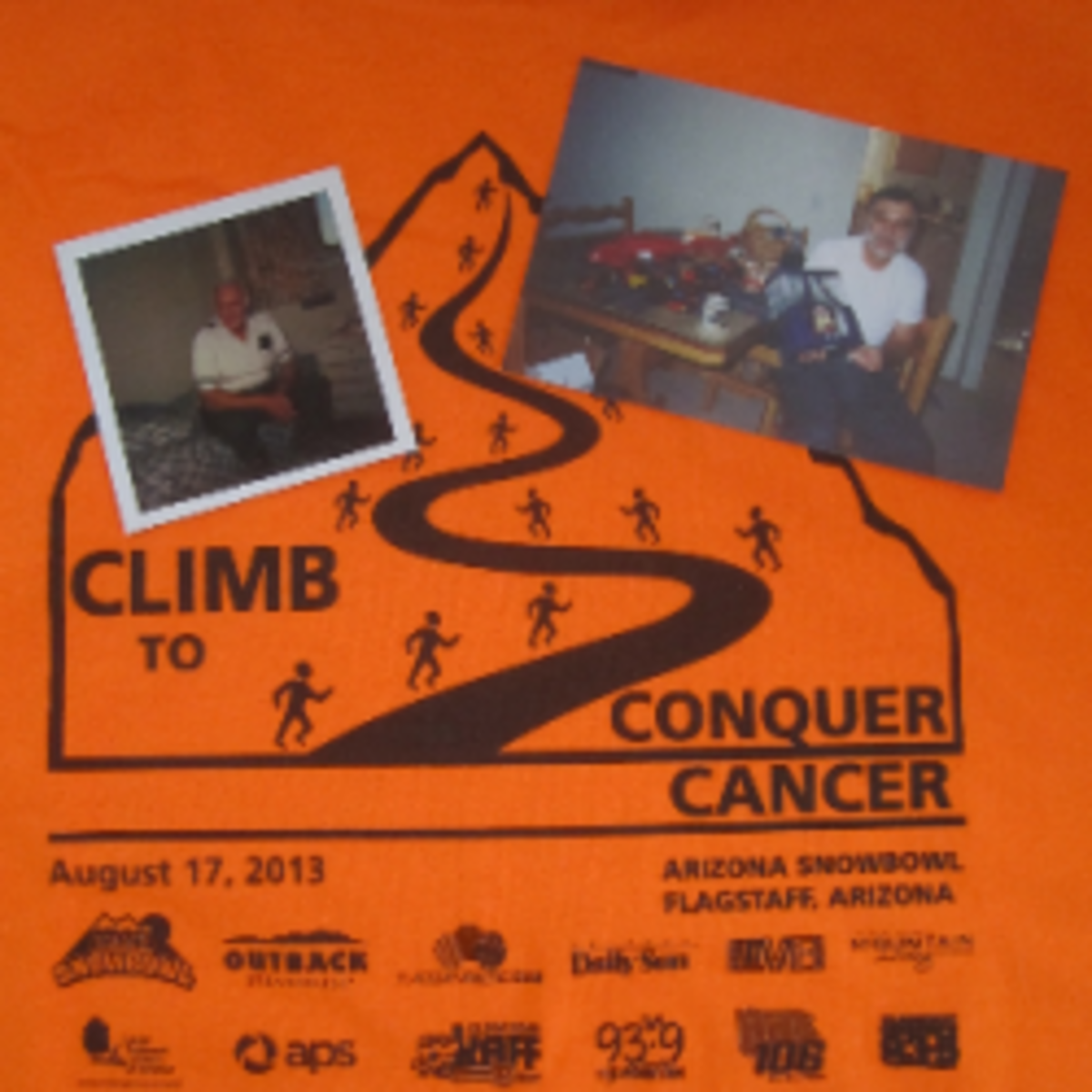Can Talcum Powder Cause Ovarian Cancer?
We've Grown Up With Talcum Powder
For generations, mothers have used talcum powder on their babies' bottoms to ease the sting of diaper rash. Many people also put this sweet-smelling substance on their bodies after they showered. Sometimes women would even sprinkle talc on their under garments before wearing them.
Unfortunately, no one realized this practice could potentially lead to an increased risk of ovarian cancer.
How can something as seemingly innocent as talcum powder, long associated with infants, children, hygiene and cleanliness, turn out to be a potential carcinogen? After all, most of us grew up with the stuff, and viewed it as a harmless way to promote good hygiene.
Through the years, it's also been heavily marketed, to the point where few people would consider equipping a nursery without talcum powder. Many parents automatically reach for the baby powder every time they change a diaper.
But just how dangerous is this practice? What's actually present in talcum powder that can help switch healthy cells into a cancerous ones? And, if there is a risk, why is talc still found in a wide range of personal care products?
Talcum Powder has been Marketed for Generations
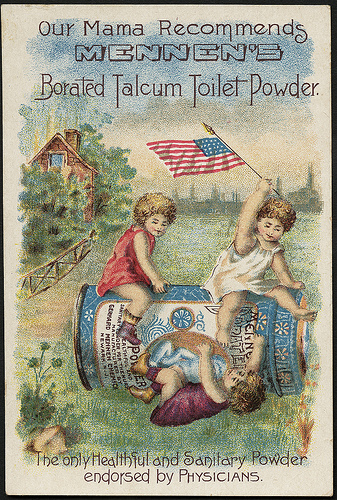
The First Alarms Were Sounded
In 1970, the prestigious British medical journal known as The Lancet published the first of a number of studies that have found an link between using talcum powder to dust the peritoneal area can later lead to malignancy. More research through the years supported this conclusion.
In 2003, a large retrospective study was done, looking at previously published findings. The conclusion reached was that regular use of talcum powder as a feminine hygiene product raised the overall risk of ovarian cancer by 33 percent. More recent British research showed this heightened incidence was 24 percent above normal.
Of course, even if you use talcum powder every day, you still have a relatively remote chance of developing ovarian cancer, which strikes about 14,000 women each year in the United States. Or, to put it another way, each woman has a 1.4 percent chance of developing this disease. If talcum powder is factored into the equation, her risk rises to 1.8 percent.
However, these figures mean absolutely nothing to the women currently battling the disease. If it happens to you, then hearing of this relatively small risk is little consolation.
The Truth About Your Beauty Products
What the American Cancer Society Says About Talcum Powder and Cancer
The American Cancer Society points out that talcum powder on the market is now free of asbestos, and have been since the 1970s. Unrefined talcum powder may contain asbestos. Some experts, however, believe that even asbestos-free talc can be dangerous if used by women for feminine hygiene purposes. The ACS claims that research of the cancer risk with the newer products on the market does not clearly show a risk, as study results have been mixed.
However, the ACS website noted that one study did find that talcum powder seemed to slightly increase a menopausal woman's risk of uterine cancer. The organization also mentioned the large study conducted in 2003 that did show a slight increase in ovarian cancer among regular talc users.
The conclusion arrived at by the ACS is that if one is concerned about a potential health risk, to stop using products containing talc.
Talcum Powder has Long Been Associated With Good Hygiene
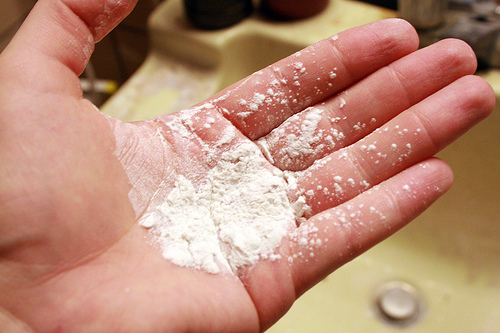
Is Cornstarch a Good Alternative to Talc?
Some people who've been concerned about talc have switched to body powder made from cornstarch, another material that's good at absorbing moisture. However, much of the corn grown in the United States comes from genetically modified crops, raising new concerns about this substitute. Ingestion of genetically modified corn has been linked to cancer in laboratory animals.
However, there are organic herbal body powders available that do not contain talc or cornstarch.
The First American Lawsuit
Patients who believe their ovarian cancer was caused by talc use have begun to file lawsuits. A number of legal firms around the country have also started reaching out to women suffering from ovarian cancer.
In 2013, in a landmark case known as Deane Berg vs. Johnson & Johnson, which was heard in federal court in Sioux City, the jury found that talc was indeed a a contributing cause in one case of ovarian cancer. Berg, who was 56 at the time of the trial, had used talcum for 30 years. One specific product known as Shower to Shower was mentioned in court.
However, Berg was not awarded damages, but did conclude that the public should be made aware of the potential cancer link, when using talcum-based products for feminine hygiene, according to another published report.
Although the connection between talcum powder and cancer is still controversial, the proof that this mineral is a causative factor is arrived at after studying samples of ovarian tissue. If particles of talc are found in the tumor, then it's generally agreed that this was one of the triggers. Talc was found in Berg's tissue samples, which were independently analyzed by three physicians, as it was reported in the local newspaper that covered the trial.
One of the doctors who testified stated that he believed that talcum powder is a contributing cause for about 10,000 of the ovarian cancer cases diagnosed each year in the United States.
Which Personal Care Products Contain Talc?
Body Powder
| Makeup
| Deodorant
| Sanitary Napkins
| Pharmaceuticals
|
|---|---|---|---|---|
Talc can still be found in body powders designed for men, women and children.
| Liquid foundation designed for skin care and blemish coverage often contains talc.
| Underarm deodorant often contains talc.
| Scented or deodorant versions of sanitary pads may contain talc.
| Talc is a common filler material in tablets, and is found in many prescription and non-prescription products.
|
Cancer Step Outside the Box
How it's Believed Talc Could Cause Cancer
Researchers familiar with the issue believe that talc can travel through a woman's reproductive system and lodge in her ovaries. Because it's difficult for a body to break down this foreign substance, the talc particles act as an irritant, eventually producing a malignancy.
It's known chronic inflammation can set the stage for cancer. Someone with chronically inflamed ovaries would be at heightened risk of developing an ovarian tumor.
Inhaled asbestos is known to be a causative factor in lung cancer. There's also evidence that talc miners have an increased incidence of this disease.
Talc is Still Used on Babies
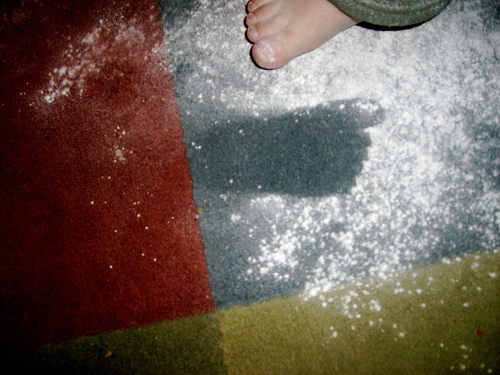
Talcum Powder in Products Today
Currently, the FDA does not ban talcum powder in cosmetics and other personal care products. It is even considered by the agency to be a Generally Recognized as Safe ingredient in some foods, such as table salt, as long as concentrations remain below a minimum level.
This regulatory body also does not require a special label required warning women of this potential hazard, especially if they use talc in the peritoneal region. There is also no language that specifically warns against using talc-containing baby powder to prevent diaper rash. This mineral, which contains magnesium, silicon and oxygen, has a unique ability to absorb moisture, which is why it is so frequently used on a baby's bottom.
Refined talc is now found in a wide range of products, such as paint, plastics, food and pharmaceuticals. It is a common binding agent in both prescription and over-the-counter medications. The word "talc," however, may not be appear on the label. Instead, it may be listed under its chemical name of magnesium silicate.
The ACS Position on Talc and Ovarian Cancer
- http://www.cancer.org/cancer/cancercauses/othercarcinogens/athome/talcum-powder-and-cancer
Talcum powder is made from talc, a mineral composed mainly of the elements magnesium, silicon, and oxygen. It is widely used in cosmetic products such as baby powder and adult body and facial powders.
Disclaimer
These statements have not been evaluated by the Food and Drug Administration (FDA). These products are not meant to diagnose‚ treat or cure any disease or medical condition.
Disclosure
I am a participant in the Amazon Services LLC Associates Program, an affiliate advertising program designed to provide a means for sites to earn advertising fees by advertising and linking to amazon.com.



